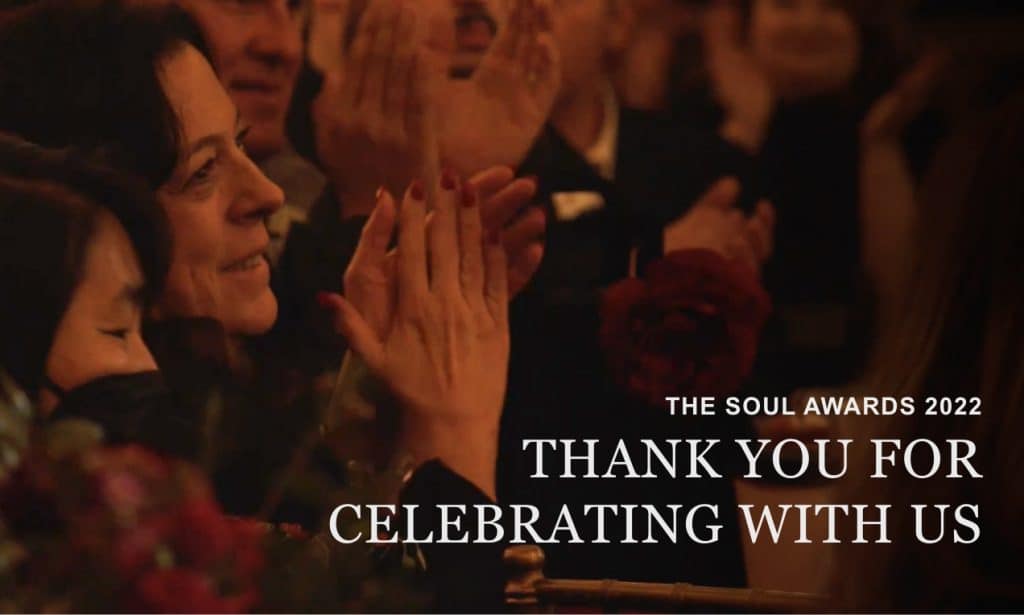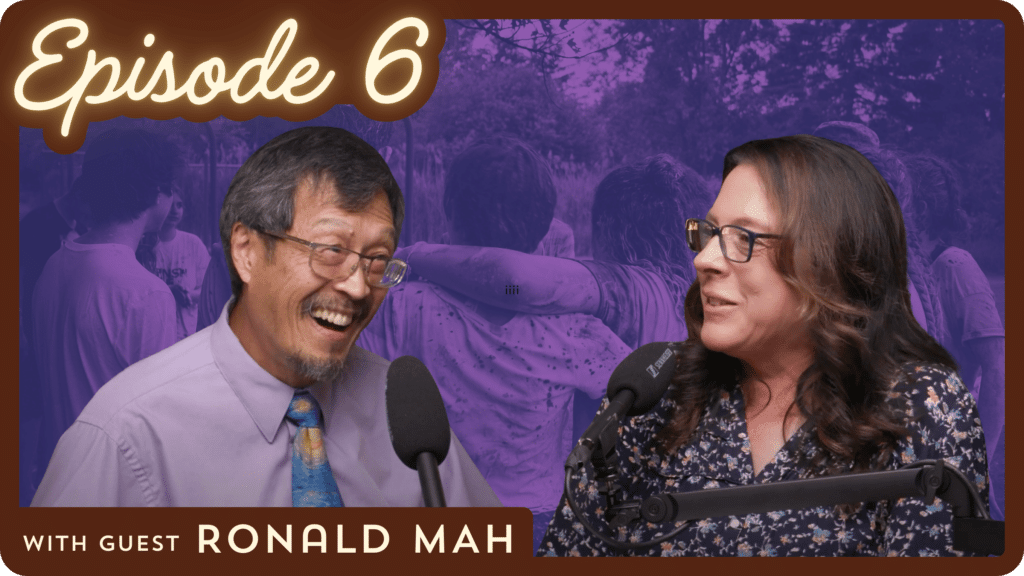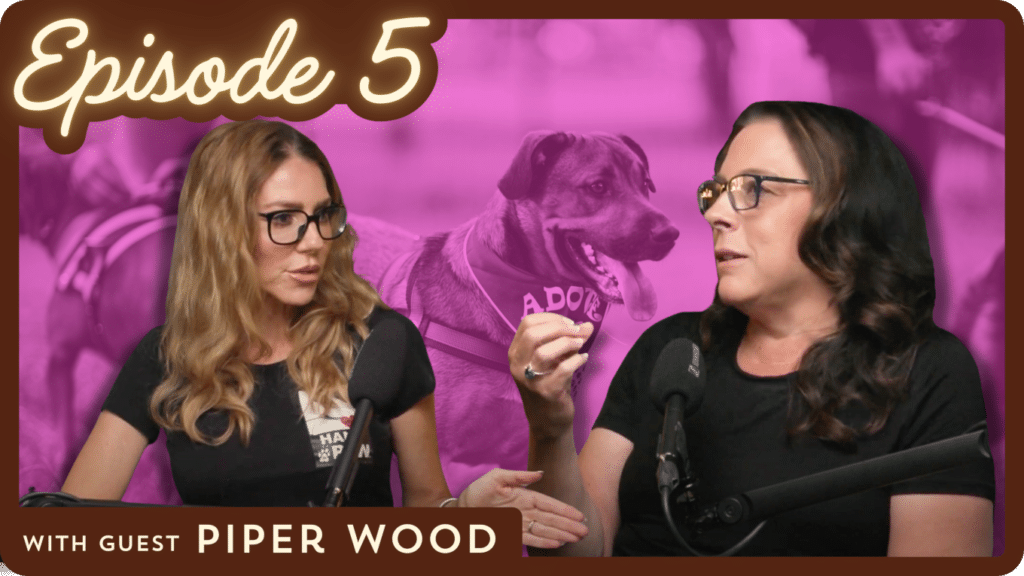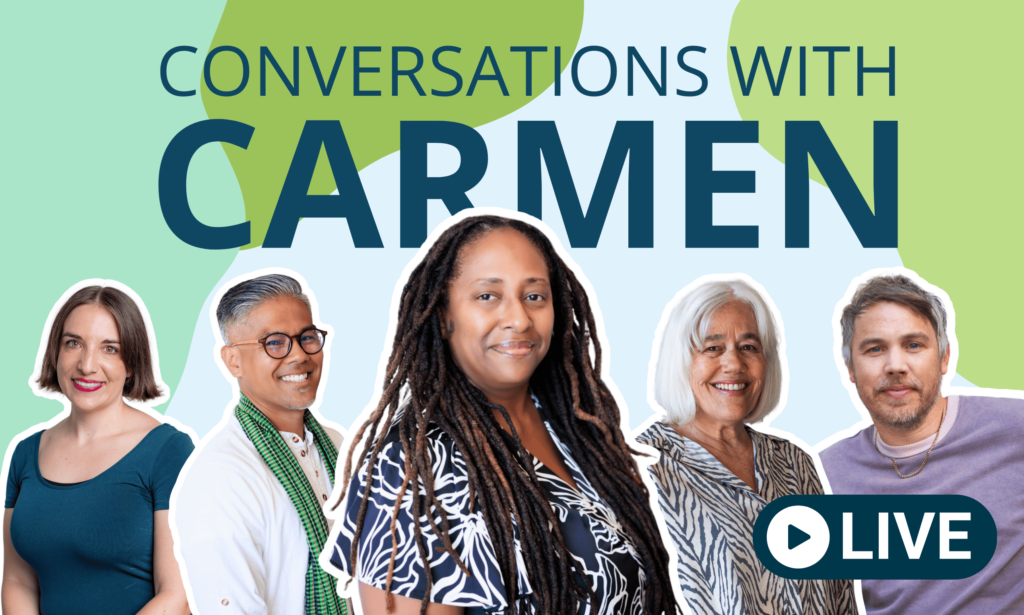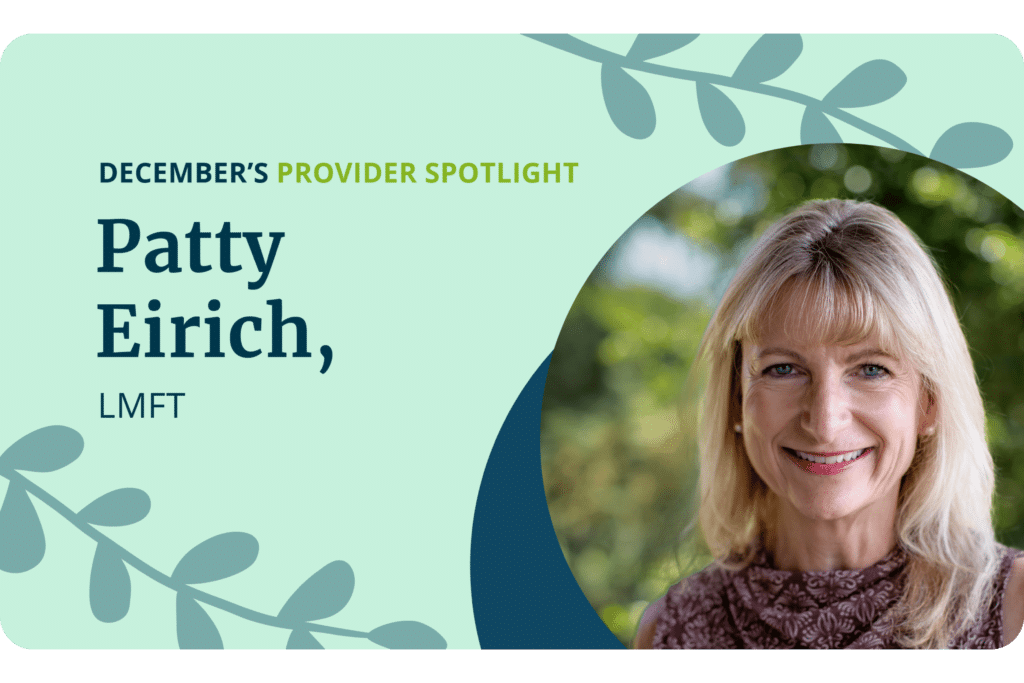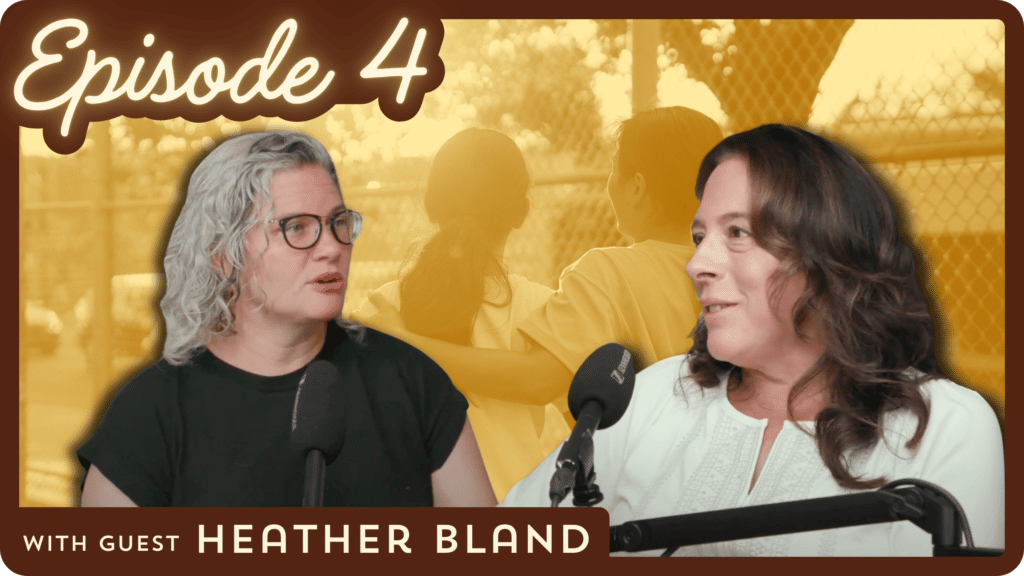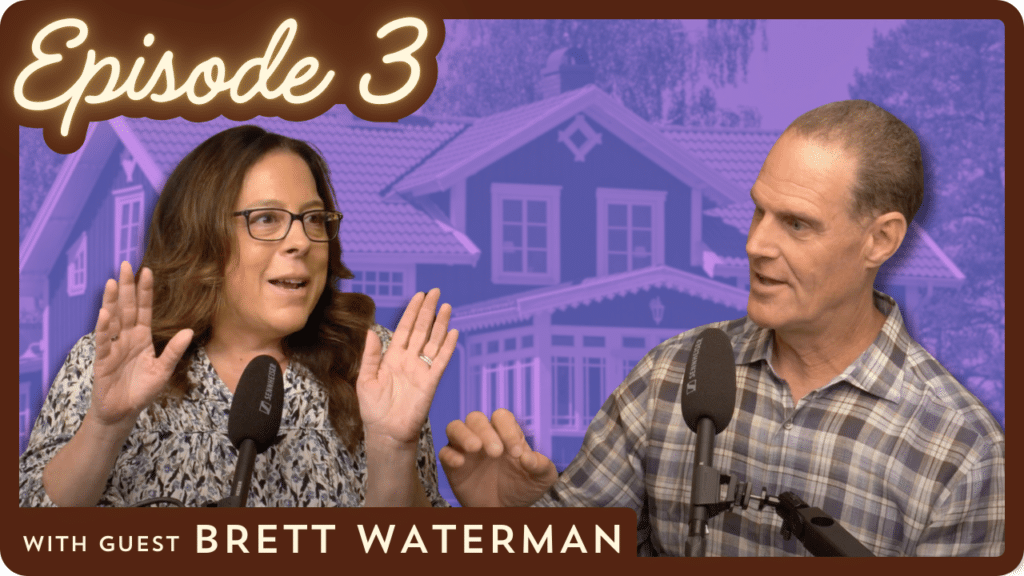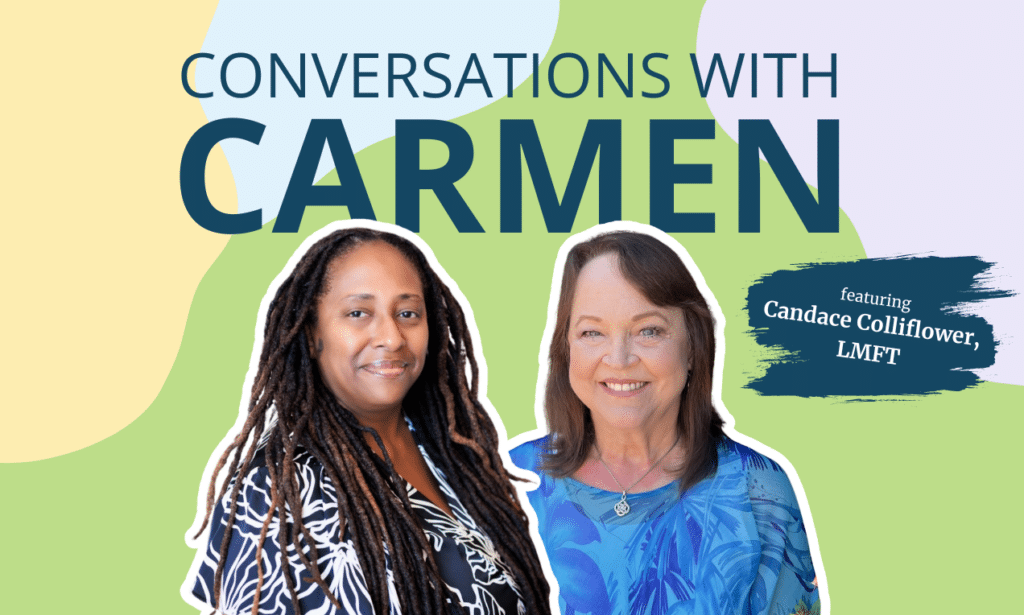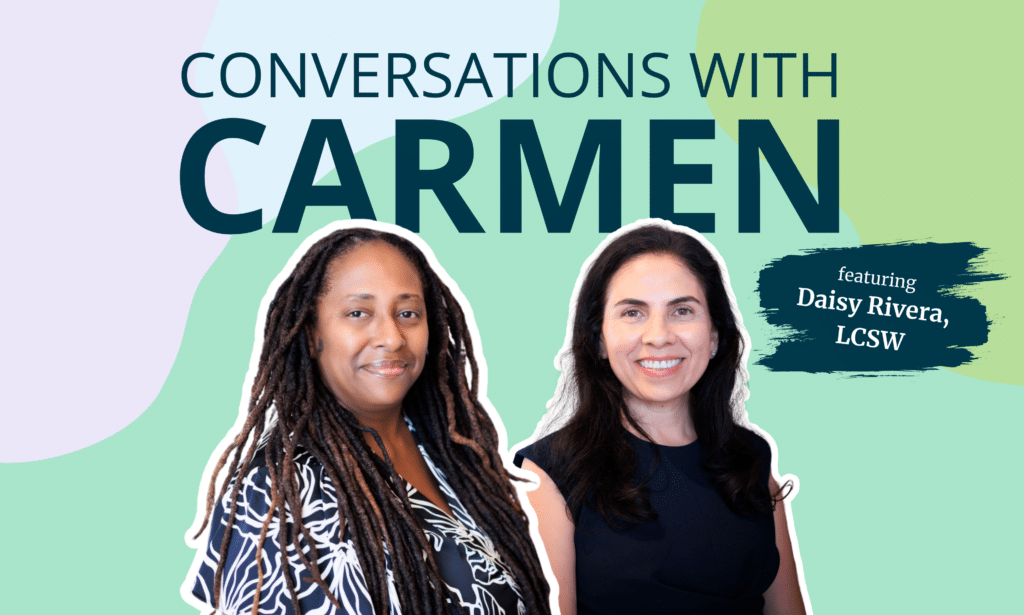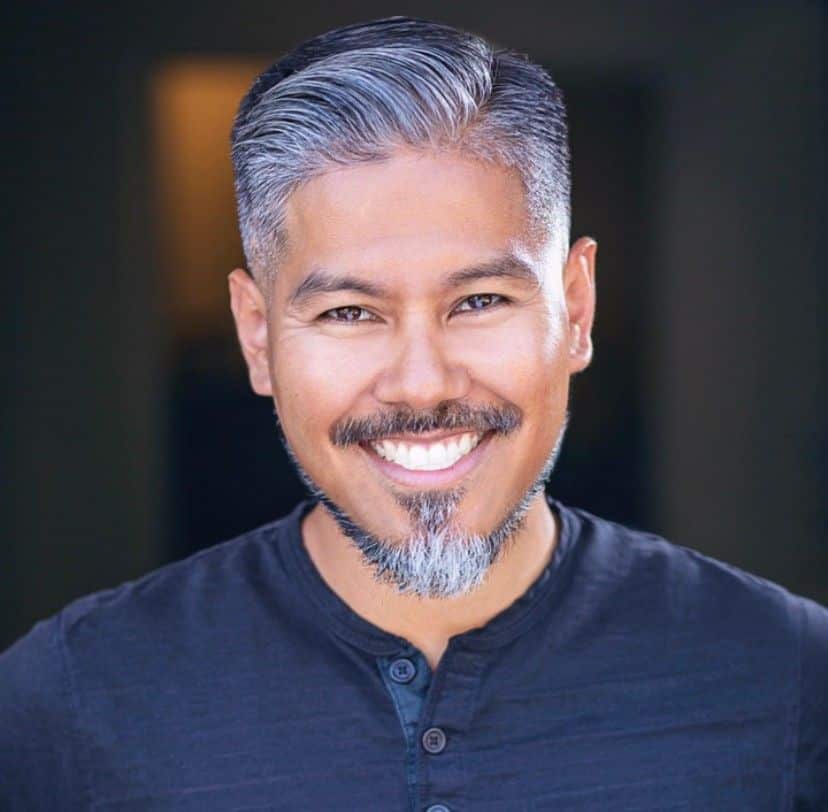
In the May installment of Conversations with Carmen, Dr. Carmen Majid explores how Pisey Sok discovered that seeking truth, speaking blessing, being creative, and finding joy in helping others is the essence of life. She also dives into how Pisey uses his approach and perspectives in his therapy.
Read the full interview below to learn more about Pisey’s acculturation process and why he learned to be an “amphibian” rather than a “chameleon.”
You shared that you joined the Soultenders provider network in 2020 subsequent to having worked in Community Mental Health for some time. What was the transition from CMH to private practice like for you? How did CMH prepare you for working with private clients?
What community mental health taught me the most was humility. It showed me a lot about my insecurities and taught me always to have a posture of learning and allow my clients to teach me about myself. I learned more from my clients than from most books I read in school. I discovered that the human soul is too complex to conceptualize with one modality or psychological approach.
Working with the Cambodian community in Long Beach helped me to reconnect with my cultural roots and the sacredness of my story, language, and people. I rediscovered that the sacredness of spirituality, culture, and spiritual practices are essential to the healing process of immigrant communities dealing with complex trauma. In addition, working in community mental health helped me to appreciate the sacredness of time, self-care, boundaries, and margins. I quickly realized that working more hours means that you’re being more effective. I am more cognizant of my rhythms and appreciate my self-care as sacred times of rest and renewal.
Establishing my spiritual rhythms with my self-care rituals has deeply influenced my private practice and how I serve my clients. I am starting to learn more that I’m not using my work to define me; rather, I’m using my self-care and spiritual rhythms to define my work.
You shared that you and your family immigrated from Southeast Asia (Cambodia) to the United States (Oregon) in the 1980s. How did you navigate your acculturation process? Were there any challenges? How did the process impact you as a person?
I suppose the best analogy to describe my acculturation process was learning to be an “amphibian” rather than a “chameleon.” I had to navigate two different worlds without losing my distinctiveness in the process. I did not want to camouflage into my cultural surroundings, so I learned to appreciate my name, my Cambodian food, and my culture while learning to navigate the different aspects of American culture. I grew up around a lot of diversity in Southeast Portland, but my name was not common when I went to high school. I got all kinds of variations, “Pissy,” “Pie-see,” Piss-say,” yup I even got called “Pizza” by a grade school teacher during roll call. You can imagine I had to develop thick skin early in my childhood.
I was always perceptive of how people made me feel and how they carried themselves around me. My amphibious instincts helped me navigate many different cultural settings without getting uncomfortable or lost in the sea of American culture.
Although, the hardest part about the acculturation process was not about race but more about class. I experience more ridicule and bullying from the Asian American community than in any other setting. I soon discovered that socioeconomic status was more challenging to navigate than race. Growing up in an immigrant community, my family lived with very humble means, so I learned the value of handwork, integrity, and honor from my parents. I appreciate my upbringing because it’s helped me stay humble, work hard, and honor the people and resources God entrusted to me.
You shared that your father was a shaman and Buddhist healer. Did your father’s divination practice/ability personally impact you in any way? If so, how?
My father was inspired by the desire to elevate the suffering of others by pursuing truth in all its forms, both in the spiritual and physical domains. My father taught me the importance of being able to see beyond what the naked eye can’t see but can only be discerned with the lens of faith guided by reason, intuition, and tradition. I never questioned the transcendent realm and spiritual domain; I suppose it was the environment that I was brought in. My father helped me to realize that seeking truth, speaking blessing, being creative, and finding joy in helping others is the essence of life. The desire to help others find freedom from suffering and discover new meaning from their pain I draw inspiration from my father. Even though my father subscribed to the Buddhist worldview, and I subscribe to the Christian worldview, we share the same heart and desire to speak blessing and life to everyone we encounter.
You spoke a little about a traumatic personal loss that you sustained at the age of eleven. You shared that having sustained such a loss enlightened you to the “frailty of life” and the loss seemed to trigger an “existential crisis that tenderized my spirit to the hurting of others.” This sounds like an incredibly powerful subjective experience. Can you please elaborate on it?
I suppose that death could be a valuable teacher that can bring wisdom or a tyrant that can produce fear. While for others death can be an existential sedative to elevate their suffering. In my case, death was a great teacher that taught me to acknowledge my humanity and the humanity of others. After attending my friend’s funeral, I understood what grief felt like for the first time. I noticed the deep sadness that washed over my community and did not know how to comfort them. It’s often said that you know what’s in the juice after the fruit is squeezed. After my friend died, I felt like my entire life was crushed. I can see now that my broken spirit was what God used to break my egocentric framework, keep me humble about my frailty, and start to see the needs and pain of others who were suffering.
What client population(s) do you gravitate towards the most? Are there clients of particular backgrounds that tend to seek you out?
I tend to gravitate towards clients struggling with grief, loss, and trauma. I noticed I get male clients from various ethnic and cultural backgrounds looking for a male therapist of color. Sometimes, I have clients who seek out my practice due to my cultural background, Christian faith, and spiritual tradition integrated with trauma, forgiveness, and grief work.
You shared that your original intention was to become ordained as a pastor (subsequent to earning your Master of Divinity degree). Subsequently, you determined that Counseling/Therapy was your actual vocation (which inspired you to pursue your MFT license). Were there any inherent challenges born out of pivoting your professional focus in a different direction? Is there any overlap for you in terms of the two areas of professional focus?
I suppose from my perspective, the mission of my life does not change, even though my assignments may change. As a follower of Jesus, I strive to stay humble by looking to the needs and best interests of others and serving them as best as I can. The transition was not that difficult because I am doing what God has designed and called me to do. Whether I was serving as a pastor or therapist, my heart and mission did not change, which is to help people find healing, hope, and freedom.
In terms of my vocation and soul care, I don’t see any difference between providing pastoral counseling for a congregation and providing mental health counseling with a case of load of my current clients. However, the difference is the legal and ethical parameters and boundaries that I must uphold and honor. My ambition is to serve and create space for others to be honored and make room for their healing process by being a conduit of hope, peace, and blessing. In my current vocation as a therapist, I still have the heart of a pastor, but operate with the mindset of a therapist.
You described your MFT vocation as an integration of faith, healing and having a lens/framework in order to help others. Can you please elaborate on that?
We all have faith in someone or something. I suppose our faith is the sacred set of core beliefs and convictions about the world, ourselves, and the people around us. Some people’s faith is expressed through religious rituals, others through the scientific pursuit of knowledge or other non-religious traditions. As a Christian, my core belief is that life is the essence of reality, not chaos and entropy, even though we are told that entropy (i.e., the decay of life) is the eternal state of reality.
My faith informs my vocation because I believe our choices and the permission we give to our thoughts and others matters. When my clients come to therapy, they are permitting me to enter a sacred space with the mission of finding healing, freedom, and wholeness—which in my opinion, is seeking to honor life. As therapists, we assume that health is better than sickness and life is better than death. Even if a person wants to choose death, it’s generally for the purposes of experiencing relief, healing, or resolution from suffering, which in my opinion, is an aspect of seeking to experience a new aspect of life. My faith informs my desire to help others heal because God is the true source of life, and healing essentially is restoring life. My faith informs me that people are made in the image of God. Therefore, it stands to reason that as a person of faith, the closer a person is to finding healing, the closer they are to life, and the more life is restored in a person, the close they are to the source, namely God.
My vocation as a therapist is to help others discover their God-given capacity to heal because I believe my God is in the healing business, not condemnation. My desire is to be a conduit of God’s love and generosity towards others and create space for people to find healing. When they find healing, they will experience a bit more of God’s presence each day on earth as it is in heaven.
You mentioned that you utilize CBT and EMDR in your practice. Additionally, you shared that you focus on practicing Restoration Therapy with clients as well. You mentioned that Restoration Therapy (which is rooted in Contextual Therapy) aims to assist clients with fostering their own ‘forgiveness work’ (including finding the balance between love and trustworthiness). Can you please elaborate?
I was trained in Restoration Therapy under the guidance of Dr. Terry Hargrave, who was the founder. Restoration therapy conceptualized pathology from that standpoint of emotional debt through violations of love (identity) and trustworthiness (safety). The violation of these two domains within interpersonal relationships creates an emotional debt that manifests in negative core beliefs and behaviors, which leads to psychological pathologies.
The focus of the treatment is working to address resentment and bitterness from the violations of love and trustworthiness that occurred in the relationship through the work of forgiveness. The goal is to keep the emotional debt from accruing interest and getting projected onto other relationships. If the debt does not get addressed through the work of forgiveness, emotional interest will inevitably compound and get transmitted in other interpersonal relationships or intergenerational dynamics.
Much of the work of forgiveness is assisting the client to recognize their emotional debt through insight, empathizing with the debt of their perpetrator through understanding, and giving permission to rebuild trust through the giving of credit, or restoring the relationship through overt forgiveness. The work of forgiveness, then, is to restore the balance of identity, trust, and agency to the individual suffering from emotional and psychological debt.
How do you build rapport with your clients? How do you measure client success/strides?
I try to keep it simple and organic by taking the posture of a learner, being curious about their interests, being generous with my reflective listening, and focusing on helping clients identify their areas of joy and strengths, rather than fixating on pathology. I usually measure success and growth based upon the mindset shifting from a victim to an overcomer, becoming more generous with their time, words, and resources, finding joy in the small things, increasing in creativity, creating healthy boundaries and margins with self-care, being pessimistic to optimistic, and moving from complaining to gratitude.
You briefly spoke about the intersectionality of spirituality, interpersonal identity and culture that you make consistent efforts to focus on in your practice. What does this process look like? How would you say the process potentially impacts client outcomes?
I believe culture is an expression of our spirituality and identity. Spirituality is the essence of our humanity, whether is expressed in religious or non-religious ways. Even a secular person who does not believe in God or value religious institutions will find themselves interested in exploring and trying to discover if there is life beyond our planet through space exploration.
Our hearts seem to be drawn toward transcendence. I often see this while my clients are grieving. Even some of the clients who are non-religious and agonistic would talk about their deceased family members being in a better place after death. They would express their spirituality about hoping their loved ones “rest in peace.” Many of my clients seek treatment to make sense of their own healing from their grief and loss.
In my practice, I intentionally create space for my clients to explore and articulate their worldview and how it informs their existential struggles. I usually restrain offering my opinions about my worldview and offer a generous space for my client to explore and rediscover the sacred stories, traditions, and memories from their upbringing and cultural heritage. Once they rediscover and reappraise their sacred treasures from their family stories, culture, and spiritual heritage, it can be cultivated to develop culturally informed mourning rituals that lead to acceptance and new meaning of their grief, loss, suffering, and trauma.
You shared that helping certain clients “reintegrate parts of their story” is an integral part of your practice as well. What does this consist of? How do you recognize when a client has achieved this personal goal?
Similar to the answer I previously gave in the previous question, it is helping the client evaluate and reappraise their spiritual, cultural, and interpersonal identity. This process of reintegrating a person’s story consists in exploring and evaluating the client’s personal narrative and helping them to discern and appraise what is fruitless, common, sacred, and holy in their story.
Once the client is able to differentiate between common experiences vs. sacred experiences, I assist the client in identifying their core values and beliefs drawn from those stories and use them to challenge their negative core beliefs and provide cognitive restructuring to reappraise their sense of identity and worth. While helping my clients develop new rituals that will promote trustworthiness and honor the sacredness of their cultural traditions, spirituality, and core values.
How do you incorporate Christianity into your practice?
The essence of the Christian faith is the belief that God descended into our human experience in the person of Jesus the Messiah and embodied the virtues of altruistic love, humility, and generosity by pouring out the “Breath of Life” back into distorted humanity. It reveals that God humbled himself by taking on the characteristics of a humble servant to shine the light of God’s love into the dark areas of our human experience.
I suppose it can be summed up by the timeless children’s song I use to sing in church, “This little light of mine, I am going to let it shine, this little light of mine, I am going to let it shine, let it shine, let it shine, let it shine…” I am not the light, my job is to bring the light and let it shine in all aspects of my life, including my vocation and practice. One aspect of my faith that I bring into my clinical practice is speaking a word of blessing, life, and peace over my clients. Blessing our neighbors is an important aspect of the Christian faith, as well as my Cambodian culture, regardless of people’s religious worldview. I am called to bless and not curse.
During the last session before my clients graduate from treatment, I will ask if I may speak a five-fold blessing over each of my clients from my Cambodian culture and inspired by my Christian faith. I generally speak the blessing in Khmer and offer a follow-up interpretation in English. It goes something like this, “May you have āyu (longevity), may your face radiate the life from within (vannak), may the life within you produce peace (sukha), may you have strength to endure and persevere through all the hardship (pulak), and may you have wisdom (pakdekpyneak) to discern the path ahead.”
You shared that prior to 2020, you resided in Pasadena, CA. What motivated you to relocate to Tennessee? What are the advantages of being licensed in two states?
The short answer was the pandemic and the cost of living. My spouse at the time got a grant for a start-up company researching the integration of faith and psychology. I was fortunate to have my LMFT license honored in Tennessee through the reciprocity process. Being able to practice in two states has expanded my career opportunities and business to serve more clients in California and Tennessee.
You mentioned that your overarching goal in your practice is to “create a generous space” for your clients. What exactly does this mean to you? How do you know when you have succeeded in doing so?
I suppose it is similar to the Rogerian client-centered approach and having unconditional positive regard and honor for each unique life under my care. It is to honor and validate all of the client’s feelings, thoughts, and experiences equally by suspending judgment about their values or validity. I know I have succeeded in creating a generous space when my clients grant me permission to speak into their stories without defensiveness or resistance and allow me to sit with them in their darkness without fear or shame.
Is there anything else that you would like us to know about you that I didn’t inquire about?
I enjoy cutting hair and barbering as a creative outlet. I cut my own hair after college subsequent to receiving a very bad hair cut from a place called “Perfect Touch” in a local town strip mall. Let’s just say after I received the haircut, there was nothing “perfect” about my hair. After I got over the trauma, I started cutting my own hair and I’ve been doing so ever since. I find that cutting hair is a sacred, vulnerable, and generous space that I get to cultivate for other men in my community. I am blessed to be able to share my therapeutic influence beyond the walls of my private practice. I have the opportunity to serve in a hair cutting ministry at my local church where a team of barbers, stylists, and cosmetologists get together once a month to bless low-income families by cutting their children’s hair. It is another place I am honored to let the light of God shine.

